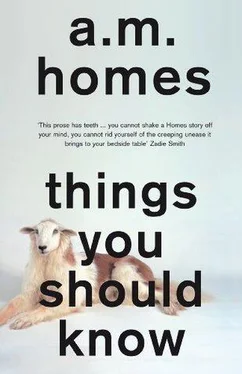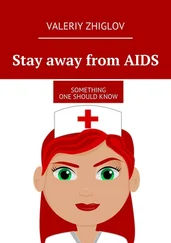I interrupt her. “Do you want anything from the house?”
“Clean socks, a pair of sweat pants, my hairbrush, some toothpaste, my face soap, a radio, maybe a can of Diet Coke.”
“You’re only going to be there a couple of days.”
“You asked if I needed anything. Don’t forget to feed the dog.”
Five minutes later she calls back, crying. “I have ovarian cancer.”
I run out the door. When I get there the room is empty. I’m expecting a big romantic scene, expecting her to cling to me, to tell me how much she loves me, how she’s sorry we’ve been having such a hard time, how much she needs me, wants me, now more than ever. The bed is empty. For a moment I think she’s died, jumped out the window, escaped. Her absence is terrifying.
In the bathroom, the toilet flushes. “I want to go home,” she says, stepping out, fully dressed.
“Do you want to take the flowers?”
“They’re mine, aren’t they? Do you think all the nurses know I have cancer? I don’t want anyone to know.”
The nurse comes with a wheelchair; she takes us down to the lobby. “Good luck,” she says, loading the flowers into the car.
“She knows,” my wife says.
We are on the Long Island Expressway. I am dialing and driving. I call my wife’s doctor in New York.
“She has to see Kibbowitz immediately,” the doctor says.
“Do you think I’ll lose my ovary?”
She will lose everything — instinctively I know that.
We are home. She is on the bed with the dog on her lap. She peeks beneath the gauze; her incision is crooked, the lack of precision an incredible insult. “Do you think they can fix it?”
In the morning we go to Kibbowitz. She is again on a table, her feet in the stirrups, in launch position, waiting. Before the doctor arrives she is interviewed and examined by seven medical students. I hate them. I hate them for talking to her, for touching her, for wasting her time. I hate Kibbowitz for keeping her on the table for more than an hour, waiting.
And she is angry with me for being annoyed. “They’re just doing their job.”
Kibbowitz arrives. He is enormous, like a hockey player, a brute and a bully. It is hard to understand how a man gets gynecologic oncology as his calling. I can tell immediately that she likes him. She will do anything he says.
“Scootch down a little closer to me,” he says, settling himself on a stool between her legs. She lifts her ass and slides down. He examines her. He looks under the gauze—“Crooked,” he says. “Get dressed and meet me in my office.”
“I want a number,” she says. “A survival rate.”
“I don’t deal in numbers,” he says.
“I need a number.”
He shrugs. “How’s seventy percent?”
“Seventy percent what?”
“Seventy percent live five years.”
“And then what?” I ask.
“And then some don’t,” he says.
“What has to come out?” she asks.
“What do you want to keep?”
“I wanted to have a child.”
This is a delicate negotiation; they talk parts. “I could take just the one ovary,” he says. “And then after the chemo you could try and get pregnant and then after you had a child we could go in and get the rest.”
“Can you really get pregnant after chemo?” I ask.
The doctor shrugs. “Miracles happen all the time,” he says. “The problem is you can’t raise a child if you’re dead. You don’t have to decide now, let me know in a day or two. Meanwhile I’ll book the operating room for Friday morning. Nice meeting you,” he says, shaking my hand.
“I want to have a baby,” she says.
“I want to have you,” I say.
Beyond that I say nothing. Whatever I say she will do the opposite. We are at that point — spite, blame, and fault. I don’t want to be held responsible. She opens the door of the consulting room. “Doctor,” she shouts, hurrying down the hall after him, clutching her belly, her incision, her wound. “Take it,” she screams. “Take it all the hell out.”
He is standing outside another examination room, chart in hand.
He nods. “We’ll take it through your vagina. We’ll take the ovaries, the uterus, cervix, omentum, and your appendix, if they didn’t already get it in Southampton. And then we’ll put a port in your chest and sign you up for chemotherapy — eight rounds should do it.”
She nods.
“See you Friday.”
We leave. I am holding her hand, holding her pocketbook on my shoulder, trying to be as good as anyone can be.
“Why don’t they just say ‘eviscerate’? Why don’t they just come out and say, on Friday at nine we’re going to eviscerate you — be ready.”
“Do you want a little lunch? Some soup? There’s a lovely restaurant near here.”
She looks flushed. I put my hand to her forehead. She’s burning up. “You have a fever. Did you mention that to the doctor?”
“It’s not relevant.”
Later, when we are home, I ask, “Do you remember our third date? Do you remember asking — how would you kill yourself if you had to do it with bare hands? I said I would break my nose and shove it up into my brain, and you said you would reach up with your bare hands and rip your uterus out through your vagina and throw it across the room.”
“What’s your point?”
“No point — I just suddenly remembered it. Isn’t Kibbowitz taking your uterus out through your vagina?”
“I doubt he’s going to throw it across the room,” she says. There is a pause. “You don’t have to stay with me now that I have cancer. I don’t need you. I don’t need anyone. I don’t need anything.”
“If I left, I wouldn’t be leaving because you have cancer. But I would look like an ass, everyone would think I couldn’t take it.”
“I would make sure they knew it was me, that I was a monster, a cold steely monster, that I drove you away.”
“They wouldn’t believe you.”
She suddenly farts and runs, embarrassed, into the bathroom — as though this is the first time she’s farted in her life. “My life is ruined,” she yells, slamming the door.
“Farting is the least of it.”
When she comes out she is calmer, she crawls into bed next to me, wrung out, shivering.
I hold her. “Do you want to make love?”
“You mean one last time before I’m not a woman, before I’m a dried old husk?”
Instead of fucking we fight. It’s the same sort of thing, dramatic, draining. When we’re done, I roll over and sleep in a tight knot on my side of the bed.
“Surgical menopause,” she says. “That sounds so final.” I turn toward her. She runs her hand over her pubic hair. “Do you think they’ll shave me?”
I am not going to be able to leave the woman with cancer. I am not the kind of person who leaves the woman with cancer, but I don’t know what you do when the woman with cancer is a bitch. Do you hope that the cancer prompts the woman to reevaluate herself, to take it as an opportunity, a signal for change? As far as she’s concerned there is no such thing as the mind-body connection; there is science and there is law. There is fact and everything else is bullshit.
Friday morning, while she is in the hospital registration area waiting for her number to be called, she makes another list out loud: “My will is in the top left drawer of the dresser. If anything goes wrong, pull the plug. No heroic measures. I want to be cremated. Donate my organs. Give it away, all of it, every last drop.” She stops. “I guess no one will want me now that I’m contaminated.” She says the word “contaminated” filled with disgust, disappointment, as though she has failed, soiled herself.
It is nearly eight P.M. when Kibbowitz comes out to tell me he’s done. “Everything was stuck together like macaroni and cheese. It took longer than I expected. I found some in the fallopian tube and some on the wall of her abdomen. We cleaned everything out.”
Читать дальше












